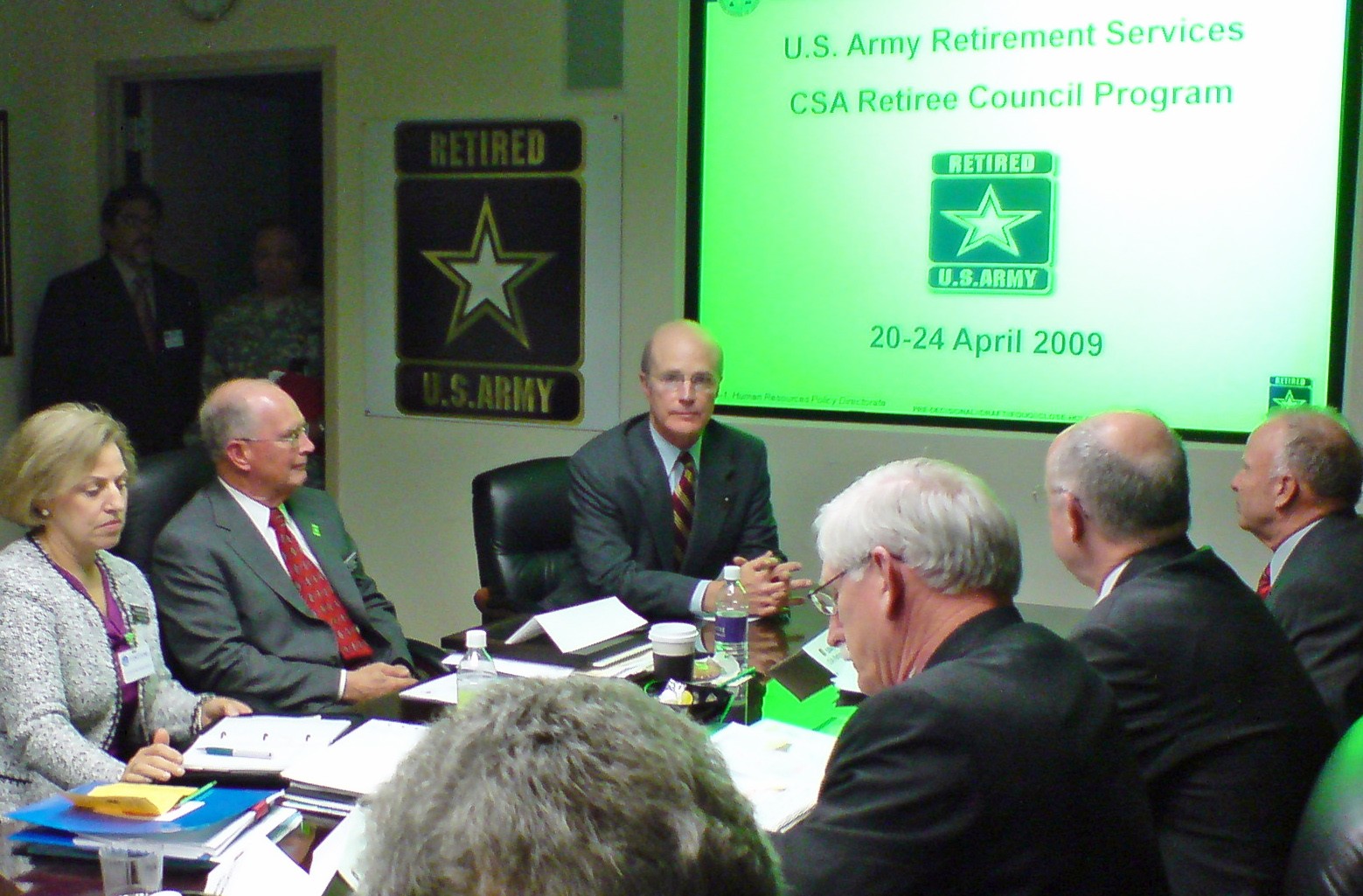WASHINGTON (Army News Service, April 30, 2009) -- Health care continues to be the single greatest issue for both current and future retired Soldiers, according to the Chief of Staff of the Army Retiree Council.
The council co-chairmen met with Gen. George W. Casey Jr. to report the top retiree issues April 29, after the council's 49th meeting, held April 20-24 in the Pentagon.
The council, chaired by retired Lt. Gen. Frederick Vollrath and retired Sgt. Maj. of the Army Jack Tilley, is made up of seven retired officers and seven retired noncommissioned officers. At their annual meeting, they reviewed 30 issues submitted by installation retiree councils, 13 of them dealing with health care.
Council members represent retired Soldiers and families worldwide. Retired and retiring Soldiers and families from the Army in Europe have been supported by retired Col. Bob Mentell since 1997, an exceptionally long period of service since most council members serve for four years.
"Being part of the chief's council and the local council means being able to stay green - to still be part of the Army," Mentell said, "It's an opportunity to pay back."
For new council member retired Command Sgt. Maj. William Hoffer, from the Carlisle Barracks, Pa., retiree council, briefings from leaders including the secretary of the Army, the vice chief of staff, and the deputy chief of staff for Personnel (G-1) gave him a better picture of the council's relationship with the Army.
"What caught my attention was that these leaders would brief us on their programs and then they would ask us for our input and for our support," Hoffer said. "You could see that the chief's council is a program where the Army is helping its own - and vice versa."
Health care
In its report to the chief of staff, the council warned that recruiting and retention would be impacted if health care policy was determined by budgetary constraints alone, without considering the sacrifices asked of the current force. The Council made the following recommendations:
Aca,!Ac Sustain the military health care system with full resourcing and emphasis on direct care.
Aca,!Ac If TRICARE fees must be increased, limit any increase in those fees to the annual rate of growth in retired pay, with special consideration to not overburdening retired NCOs E-7 and below.
Aca,!Ac Raise the TRICARE provider reimbursement levels to create the physician network needed to make care accessible for all beneficiaries.
Aca,!Ac Support legislation to authorize pre-tax payment of TRICARE enrollment fees and premiums for TRICARE supplemental, long-term care, and TRICARE Retiree Dental insurance.
Aca,!Ac Eliminate copayments for generic and chronic care drugs to encourage use of the TRICARE Mail Order Pharmacy.
Aca,!Ac Continue to support DoD and Veterans Affairs collaboration to improve the compatibility of the two health-care systems, preserving and improving benefits, and ensuring seamless transition, especially for wounded warriors.
Communication and education
In the area of strategic communication and education, the council report centered on retirement education for Soldiers and spouses still on active duty and continued communication with retired Soldiers and their families. The council said:
Aca,!Ac Educate Soldiers and spouses on their retirement entitlements and benefits, not only as they near retirement, but also as they reach the 10- to 12-year point in their careers. The council recommended adding retirement modules to courses for mid-grade and senior-grade officers and NCOs and to courses preparing Soldiers for command. They suggested that spouses receive similar instruction in Family Readiness Groups and through Army Community Services.
Aca,!Ac Continue to fund three hardcopy issues a year of Army Echoes, the bulletin for retired Soldiers and families, while encouraging, but not forcing, recipients to switch from the paper to the e-mail copy.
In areas including the Retirement Services program, retirees overseas, surviving spouses and retired pay, the council recommended:
Retirement Services Program
Aca,!Ac Raise the level of funding for pre-transition and post-transition services for all installations/garrisons worldwide.
Aca,!Ac Establish RSO positions in accordance with the Installation Management Command approved organization and fill those positions at the targeted salary rate by the end of fiscal year 2009.
Aca,!Ac Establish RSOs at major Reserve and National Guard commands to ensure that all retiring and retired Guard and Reserve Soldiers, their families and survivors are informed on retirement-related benefits and entitlements.
Retirees overseas
Aca,!Ac Support a test program in which retired members of all services who are supported by APOs in Germany would be allowed to send and receive parcels weighing up to five pounds, for the purpose of quantifying impact.
Aca,!Ac Urge the director of the Defense Finance and Accounting Service to establish a toll-free line for countries such as Germany and Korea with sufficient beneficiary population.
Surviving spouses
Aca,!Ac Eliminate the dependency and indemnity compensation offset to the Survivor Benefit Plan annuity.
Aca,!Ac Authorize space-available air travel for surviving spouses.
Aca,!Ac Issue eligible surviving spouses an indefinite ID card at age 65.
Retired pay
Aca,!Ac Recognize the extraordinary service of Army Reserve and National Guard Soldiers by including mobilization periods in support of contingency operations beginning on or after Sept. 11, 2001, when determining eligibility date for retired pay (instead of the current effective date of Jan. 28, 2008) and by providing medical benefits concurrently with retired pay.
Aca,!Ac Provide full concurrent receipt of military retired pay and VA disability compensation for all eligible military retirees.
Aca,!Ac Support the amendment of Title 10, U.S. Code, to forgive any overpayment of retired pay for any period after the date of death of the retiree through the last day of the month in which death occurs.
The council co-chairmen are scheduled to meet again with the chief of staff of the Army in October to update him on the progress being made with these issues and to offer their further support.
(Laura Paul is the strategic communications director for Army Retirement Services.)


Social Sharing